Suchergebnisse
Pfad für die Realisierung von Plus-Energie-Arealen in Melk (Plus Energie Melk)
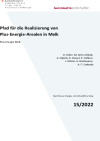
Die Stadt Melk hat sich als Ziel gesetzt, eine Vorreiterrolle im Bereich erneuerbare Energieversorgung und Klimaschutz einzunehmen. Dabei wird in einer Initiative angestrebt, Plus-Energie Areale umzusetzen. In zwei Stadtentwicklungsprojekten wird geprüft, unter welchen Rahmenbedingungen, technischen und organisatorischen Lösungen Plus-Energie Areale realisierbar sind. Ein proaktiver Beteiligungsprozess zielt darauf ab, Bauherrn und Investoren sowie andere Stakeholder von der Realisierung der Plus-Energie Konzepte zu informieren.
Schriftenreihe
15/2022
G. Hofer, M. Grim-Schlink, A. Stipsits, R. Drexel, P. Haftner, I. Röster, H. Bürbaumer, A. F. Svoboda
Herausgeber: BMK
Deutsch, 98 Seiten
Downloads zur Publikation
Fit4WienerMission (F4WM)
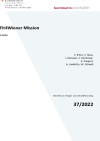
Vorbereitung auf die EU Urban Mission durch Aktualisierung von Zielen und Strategien (Smart City Wien Rahmenstrategie, Klima-Roadmap), Erarbeitung eines Manuals für klimaneutrale Wiener Grätzl und Grobkonzepte für die Beteiligung von Bürger:innen (Klima-Bürger:innenrat) und Wirtschaftstreibenden (Klima-Agreements), sowie einer stadtinternen Kapazitäten- und Strukturplanung.
Schriftenreihe
37/2022
S. Erker, S. Haas, I. Homeier, C. Kirchmair, E. Pangerl, A. Lindorfer, W. Schmid
Herausgeber: BMK
Deutsch, 41 Seiten
Downloads zur Publikation
INReS - Integration nachhaltiger Regenwassermanagement-Tools in die Planungs- Ausführungs- und Bewirtschaftungs-Software (BIM)
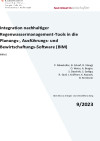
Sondierung zur Vorbereitung und Bewertung der Anwendbarkeit einer interaktiven Webanwendung zur Empfehlung geeigneter Maßnahmen im Umgang mit Regenwasser im Bestand sowie bei Neubauten, die erstens eine BIM-Kompatibilität für die objekt-bezogene Umsetzung zulässt und zweitens eine vereinfachte Anwendung in Form der Regenwasser-Toolbox ermöglicht.
Schriftenreihe
9/2023
P. Minixhofer, B. Scharf, R. Stangl, O. Weiss, A. Berger, S. Daschek, S. Szeliga, R. Graf, J. Kräftner, K. Nausch, B. Kremsner
Herausgeber: BMK
Deutsch, 118 Seiten
Downloads zur Publikation
Optimierung der SOLARenergienutzung in URbanen Energiesystemen (URSOLAR)
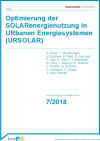
URSOLAR stellt EntscheidungsträgerInnen eine Roadmap zur integrierten urbanen Solarenergie-nutzung zur Verfügung. Es wird aufgezeigt, wie Photovoltaik (PV) und Solarthermie angepasst an infrastrukturelle und rechtliche Gegebenheiten in idealtypischen Stadtquartieren aus ökonomischer, ökologischer und sozialer Sicht sowie unter Berücksichtig von Stakeholder-Interessen optimal ge-nutzt werden können.
Schriftenreihe
7/2018
A. Posch, T. Brudermann, M. Buchner, E. Fleiß, D. Geringer, P. Hart, S. Hatzl, T. Kallsperger, G. Lang, T. Mayrold, E. Meißner, C. Reischl, G. Schnedl, S. Seebauer, K. Stöger, A. Würz-Stalder
Herausgeber: BMVIT
Deutsch, 137 Seiten
Downloads zur Publikation
vilFIT – Villach Fit 4 Urban Mission
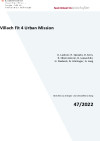
In diesem Projekt werden Maßnahmen, Strategien und der notwendige Kapazitätsaufbau für die Erreichung der Klimaneutralität der Stadt Villach vorangetrieben. Im Vordergrund stehen soziale und strukturelle Innovationen (Partizipationsprozesse, Entwicklung von Pilotinitiativen, Öffentlichkeitsarbeit, etc.) sowie die Definition von Netzwerken und Strukturen bzw. Controlling- und Monitoring-Instrumenten.
Schriftenreihe
47/2022
U. Lackner, R. Sposato, D. Kern, R. Obernosterer, B. Lepuschitz, H. Daxbeck, N. Hörzinger, G. Lang
Herausgeber: BMK
Deutsch, 37 Seiten
Downloads zur Publikation
GameOpSys - Gamification für die Optimierung des Energieverbrauchs von Gebäuden und übergeordneten Systemen
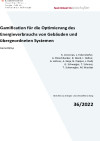
Zentrales Ziel ist die Entwicklung einer mobilen Anwendung, welche durch Partizipation des Nutzers und der Nutzerin als neue Daten- und Informationsquelle die Energieoptimierung und Planung von Gebäuden, Quartieren und übergeordneten Energiesystemen ermöglicht. Die Entwicklung der Anwendung erfolgt stark transdisziplinär und integriert dabei mathematische Methoden der Simulation und Optimierung sowie psychologische Aspekte des Nutzerverhaltens um neue Geschäftsmodelle zu erarbeiten und neue Märkte zu erschließen.
Schriftenreihe
36/2022
K. Corcoran, L. Eckerstorfer, A. Fleischhacker, B. Glock, I. Hafner, G. Lettner, A. Noja, N. Popper, J. Radl, G. Schweiger, T. Schranz, T. Schwengler, M. Wastian
Herausgeber: BMK
Deutsch, 50 Seiten
Downloads zur Publikation
Nachhaltige Sanierung und Wohnraumaktivierung einer Einfamilienhaussiedlung in Mistelbach (ReHABITAT-Siedlung)
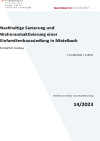
Sondierung einer nachhaltigen Einfamilienhaus-Siedlungssanierung mit ganzheitlich gedachter Nachhaltigkeitsdefinition, die beim Menschen ansetzt, auf Suffizienz basiert und auch Grün-, und Freiräume, soziale Faktoren und Mobilität mitberücksichtigt. Ergebnis ist ein integrales Gesamtkonzept auf Haus- und Siedlungsebene und eine übertragbare Herangehensweise für andere Gemeinden.
Schriftenreihe
14/2023
J. Lindenthal, J. Leitner
Herausgeber: BMK
Deutsch, 81 Seiten
Downloads zur Publikation
Wohnen 4.0 - Digitale Plattform für leistbares Wohnen
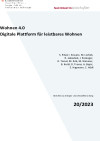
Im vorliegenden Forschungsvorhaben wurde das Rahmenwerk für die digitale Plattform "Wohnen 4.0" entwickelt, welche durch eine Parameter-Datenbank und Koppelung digitaler Werkzeuge die integrale Projektabwicklung unterstützt. Der Fokus lag dabei auf der Entwicklung und Nutzung von BIM-Objektbibliotheken für die modulare Off-Site Produktion im Geschoßwohnbau. Erstmalig wurden auch Nutzer:innen beteiligt und dadurch der zunehmend wichtiger werdende Aspekt der Partizipation integriert.
Schriftenreihe
20/2023
S. Pibal, I. Kovacic, M. Lorbek, R. Jakoubek, J. Reisinger, R. Temel, M. Ilcik, M. Wimmer, B. Kerbl, D. Travas, A. Bajric, E. Hagmann, C. Hödl
Herausgeber: BMK
Deutsch, 79 Seiten
Downloads zur Publikation
lieBeKlima - Qualitätssicherung der liegenschaftsübergreifenden Begrünung für urbane Klimaresilienz im Quartier „Am Kempelenpark“
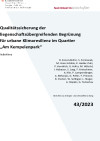
lieBeKlima hat zum Ziel, die Umsetzung eines liegenschafts- und systemübergreifenden Begrünungskonzeptes für das Quartier „Am Kempelenpark” anzustoßen und mit neuartigen, identitätsstiftenden Partizipationsprozessen und einem umfassenden Qualitätssicherungsprozess in die Realität zu bringen. Dabei liegt der Fokus auf einer verschränkten Betrachtung von integralen Begrünungskonzepten mit übergeordnetem Wassermanagement und Plus-Energie-Konzepten.
Schriftenreihe
43/2023
D. Enzersdorfer, S. Formanek, M. Grim-Schlink, K. Haider-Putz, P. Hendrich, G. Hofer, M. Hötschl, I. Hubauer, S. Jung, F. Kretschmer, A. Klie, P. Lampersberger, A. Mrkonjic, G. Peller, F. Prenner, B. Pucher, W. Sellinger, L. Steger, A. Stipsits, G. Tscherteu
Herausgeber: BMK
Deutsch, 140 Seiten
Downloads zur Publikation
Anwendung nichtlinearer Regelungstechnik und intelligenter Sensorik zur Effizienzsteigerung in Gebäuden
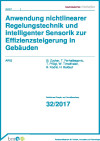
Mit modellbasierten, nichtlinearen Methoden der Regelungstechnik in Kombination mit intelligenter Sensorik, wurden im Rahmen des Projekts innovative Steuer- und Regelkonzepte für Heiz-, Kühl- und Lüftungssysteme (HKL) und Gebäudelasten entwickelt und in Gebäudemanagementsysteme implementiert.
Schriftenreihe
32/2017
G. Zucker, T. Ferhatbegovic, T. Pflügl, W. Timelthaler, B. Kodré, H. Baldauf
Herausgeber: BMVIT
Deutsch, 42 Seiten
Downloads zur Publikation
Repair & Do-It-Yourself Urbanism (R&DIY-U)
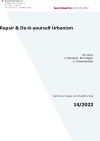
Das Projekt verfolgte die Zielsetzung, das transformative Potential des Repair & DIY-Urbanism zu stärken. Dies erfolgte im Hinblick auf eine grundlegende Umwandlung des vorhandenen wenig nachhaltigen Umgangs mit Gebrauchsgütern in konkreten Stadtbezirken, deren Infrastrukturen und dominante Wirtschafts- und Alltagspraktiken hin zu resilienten Stadtbezirken.
Schriftenreihe
14/2022
M. Jonas, S. Hassemer, M. Piringer, E. Schwarzlmüller
Herausgeber: BMK
Deutsch, 88 Seiten
Downloads zur Publikation
CO2 neutrale Stadtteilentwicklung Itzling
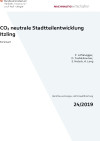
Ziel des Projekts „Itz Smart“ ist die Anknüpfung an bestehende Aktivitäten und die konsequente Weiterentwicklung des Wohnstandorts Itzling. Im Test- und Demonstrationsgebiet werden im Bereich der Verkehrsachse (Bahn und Schillerstraße) bzw. angrenzend an die Nahversorgungsachse (Itzlinger-Hauptstraße) nachhaltige Wohnquartiere mit zukunftsweisenden Mobilitätslösungen entwickelt. Die Betrachtung von „Wohnen und Mobilität“ zieht unter dem Aspekt „Stadt der kurzen Wege“ auch die Auseinandersetzung mit gezielter Mischnutzung und der Entwicklung solcher Quartiere nach sich.
Schriftenreihe
24/2019
P. Lüftenegger, D. Teufelsbrucker, S. Netsch, A. Lang
Herausgeber: BMVIT
Deutsch, 108 Seiten
Downloads zur Publikation
Nutzerorientierte Entwicklung von Technologien und Services für Energiegemeinschaften (NETSE)
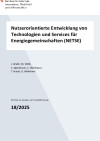
Im Projekt NETSE werden Grundlagen für die Etablierung von Erneuerbaren Energiegemeinschaften entwickelt. Dies umfassen die Ausstattung von relevanten technischen Einheiten mit geeigneten Schnittstellen, die Entwicklung einer Datenplattform für die Abwicklung von Aufgaben im Zuge des Betriebs von Energiegemeinschaften, die Entwicklung eines Tools zur Optimierung der technischen Spezifikationen sowie den Betrieb einer Energiegemeinschaft.
Schriftenreihe
18/2025
J. Walch, M. Wölk, S. Aigenbauer, C. Oberbauer, T. Nacht, D. Wilhelmer
Herausgeber: BMIMI
Deutsch, 60 Seiten
Downloads zur Publikation
Kooperatives Wohnen Volkersdorf – Suffizienz, Flächen sparen und Energieeffizienz im Areal (KooWo - Volkersdorf)
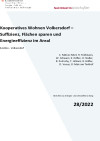
Am Beispiel des gemeinschaftlich geplanten Wohnprojekts „KooWo“ in Volkersdorf soll Suffizienz umgesetzt und das übergeordnete Ziel einer ganzheitlichen Energie- und CO2-Reduktion erreicht werden. Das Wohnprojekt verschiebt die Systemgrenze von einer nutzflächenbezogenen zu einer personen- und Sozialgemeinschaft-bezogenen Betrachtungsweise und generiert durch einen kollektiven Lebensraum Einsparungspotentiale beim Ressourcenverbrauch pro Kopf.
Schriftenreihe
28/2022
C. Falkner-Merl, H. Feldmann, W. Schwarz, K. Höfler, H. Staller, R. Pertschy, T. Urbanz, R. Höfler, D. Venus, O. Mair am Tinkhof
Herausgeber: BMK
Deutsch, 84 Seiten
Downloads zur Publikation
DALEC - Day- and Artificial Light with Energy Calculation
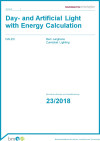
Entwicklung eines Online-Konzeptanalysetool, welches trotz einer einfachen Handhabung und kurzen Berechnungszeiten, die komplexen lichttechnischen und thermischen Vorgänge in einem Gebäude abbildet und Heiz-, Kühl- und Kunstlichtbedarf anschaulich bewertet. Zudem wurde das Nutzerverhalten berücksichtigt und visuelle und thermische Komfortkriterien analysiert.
Schriftenreihe
23/2018
Bert Junghans
Herausgeber: BMVIT
Deutsch, 41 Seiten
Downloads zur Publikation
Repair & Do-It-Yourself Urbanism (R&DIY-U)
Das Projekt verfolgte die Zielsetzung, das transformative Potential des Repair & DIY-Urbanism zu stärken. Dies erfolgte im Hinblick auf eine grundlegende Umwandlung des vorhandenen wenig nachhaltigen Umgangs mit Gebrauchsgütern in konkreten Stadtbezirken, deren Infrastrukturen und dominante Wirtschafts- und Alltagspraktiken hin zu resilienten Stadtbezirken.
Repair & Do-It-Yourself Urbanism (R&DIY-U)
The project follows the aim to analyze and to strengthen the transformative potential of Repair & Do-It-Yourself Urbanism with regard to a fundamental change of the existing poor sustainable handling of commodities in selected urban districts, their infrastructures and dominant business and private household practices into resilient areas.
Gamification als Möglichkeit für die Generierung von Daten zur energieorientierten Quartiersplanung (HotCity)
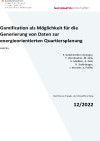
Ziel des Projekts war ein Funktionstest, ob durch Gamification kosteneffizient, rasch und zuverlässig ein aktueller Datensatz von energierelevanten Daten zur Quartiersplanung erhoben werden kann. Dies wurde am Beispiel der Potenzialermittlung von industriellen und gewerblichen Abwärmequellen in Wien und Graz ermittelt.
Schriftenreihe
12/2022
E. Gebetsroither-Geringer, T. Wernbacher, M. Göls, E. Meißner, A. Graf, R. Stollnberger, J. Worster, A. Peiffer
Herausgeber: BMK
Deutsch, 157 Seiten
Downloads zur Publikation
INN'FIT4UM - Innsbruck "Fit4UrbanMission" - klimaneutrales Innsbruck 2030
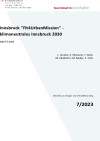
Ziel in INN’F4UM ist es, aufbauend auf einer aktuellen Darstellung der Energie- und Ressourcenflüsse gemeinsam mit der Universität Innsbruck einen Stufenplan zur Erreichung der Klimaneutralität der Stadt bis 2030 zu entwickeln.
Schriftenreihe
7/2023
L. Jänicke, K. Kleewein, Y. Back, M. Kleidorfer, M. Mailer, F. Ochs
Herausgeber: BMK
Deutsch, 39 Seiten
Downloads zur Publikation
FEELings - User Feedback for Energy Efficiency in Buildings
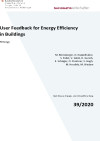
Der Energieverbrauch von Gebäuden wird maßgeblich durch das Verhalten von NutzerInnen beeinflusst. In diesem Forschungsprojekt wird ein neuartiges User-Feedbacksystem untersucht. NutzerInnen geben Feedback zur empfundenen Raumqualität. Auf Basis des Feedbacks werden Einstellungen an der Gebäudetechnik zur Energieeffizienz- und Komfortsteigerung optimiert. Der Proof-of-Concept für dieses neuartige System wird anhand von zwei Use-Cases erbracht.
Schriftenreihe
39/2020
M. Monsberger, D. Koppelhuber, S. Pabst, V. Sabol, H. Gursch, E. Schlager, O. Prentner, S. Singh, M. Herzlieb, M. Wedam
Herausgeber: BMK
Deutsch, 80 Seiten
